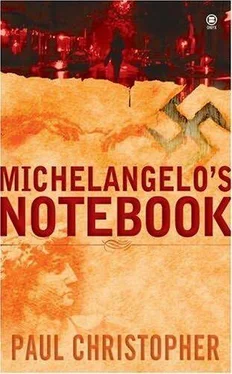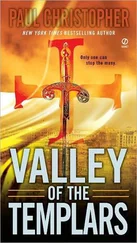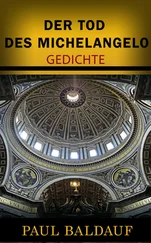Paul Christopher - Michelangelo_s Notebook
Здесь есть возможность читать онлайн «Paul Christopher - Michelangelo_s Notebook» весь текст электронной книги совершенно бесплатно (целиком полную версию без сокращений). В некоторых случаях можно слушать аудио, скачать через торрент в формате fb2 и присутствует краткое содержание. Жанр: Триллер, на английском языке. Описание произведения, (предисловие) а так же отзывы посетителей доступны на портале библиотеки ЛибКат.
- Название:Michelangelo_s Notebook
- Автор:
- Жанр:
- Год:неизвестен
- ISBN:нет данных
- Рейтинг книги:5 / 5. Голосов: 1
-
Избранное:Добавить в избранное
- Отзывы:
-
Ваша оценка:
- 100
- 1
- 2
- 3
- 4
- 5
Michelangelo_s Notebook: краткое содержание, описание и аннотация
Предлагаем к чтению аннотацию, описание, краткое содержание или предисловие (зависит от того, что написал сам автор книги «Michelangelo_s Notebook»). Если вы не нашли необходимую информацию о книге — напишите в комментариях, мы постараемся отыскать её.
Michelangelo_s Notebook — читать онлайн бесплатно полную книгу (весь текст) целиком
Ниже представлен текст книги, разбитый по страницам. Система сохранения места последней прочитанной страницы, позволяет с удобством читать онлайн бесплатно книгу «Michelangelo_s Notebook», без необходимости каждый раз заново искать на чём Вы остановились. Поставьте закладку, и сможете в любой момент перейти на страницу, на которой закончили чтение.
Интервал:
Закладка:
“Renoir, Head of a Young Girl.”
“More Nazi loot.”
“If I told you I’d seen a looted Juan Gris and the Renoir portrait in one day what would you say?”
“I’d say you’d paid a visit to Colonel George Gatty.”
“Why haven’t I heard of him before?”
“He lives in a very rarified strata. He never buys at a public auction. Very discreet.”
“Both the Gris and the Renoir are reasonably well known. Why doesn’t somebody tell the police?”
“The colonel has some very important connections.”
“Anyone in particular?”
“Is the president of the United States particular enough?”
“Impressive.”
“Not in the art world. The man is a pig. No one reputable would buy or sell for him.”
“Somebody is.”
“Who said the art world was entirely reputable?” Newman cackled again, finishing his coffee.
“Come on, Peter, it’s me you’re talking to.”
Newman sighed and put down his cup and saucer. “I would not like to be accused of being a bigot,” he said. “Such things are not good when you are an old Jew like me. Bad for my reputation.”
“Spit it out,” Valentine said, smiling.
“Let me say only this,” Newman murmured.
“The archdiocese of New York has some very fine collections under the purvue of its archives division. They also have ready access to the Vatican collections in Rome. Colonel Gatty, by the way, is what they refer to as a ‘Friend’ of the Vatican museums.”
“You’re kidding.”
“Not at all,” countered Newman. “The Vatican museums were founded in the 1500s. Their collection is… how shall I put this… extensive. Like any other museum, they regularly deaccession. When they do, the colonel is first in line.”
“The Vatican is dealing in looted art?”
“I never said that. Not really.” Newman pursed his lips into a small smile.
“Christ,” Valentine whispered.
“I seriously doubt that he was directly involved,” said Newman, cracking himself up again.
Valentine tried to clear his thoughts. “All right,” he said after a moment. “Forget about the Vatican. What about the Parker-Hale?”
“Private art museum with an endowment about as big as the Whitney but smaller than the Getty.”
“A player?”
“Undoubtedly.”
“Alexander Crawley?”
“Like Juan Gris, he too is dead. Nasty.”
“His reputation?”
“Academically it was unblemished. Columbia, Harvard or Yale-I forget which. Studied conservation in London at the Courtauld Institute of Art, curator at the Fogg in Boston, that sort of thing. Went to the Parker-Hale under the wing of the director, James Cornwall, in the mid-nineties. Took over as acting director a year ago when Cornwall passed on.”
“Passed on?”
“It is how alter cockers like myself refer to dropping dead. And by the way, in Cornwall’s case it was peacefully-Az a yor ahf mir, May I be so lucky-in his sleep. He’d had several heart attacks. He was in his eighties, I believe.”
“You said Crawley was academically clean; what about otherwise?”
“Socially very good with people, an excellent fund-raiser. He tended to cheat when it came to buying and selling.”
“How so?”
“It was in the way of being a ring; you know what that is, of course.”
Valentine nodded. In the business of art and antiquities a ring was a secret association of dealers who conspired to keep the prices down at auction. Not only were they frowned upon, they were illegal, constituting both fraud and price-fixing.
“He had his friends, then?”
“That’s right, and it was a circle that is very difficult to break in to.” Newman frowned. “An interesting connection, if that’s what you’re looking for.”
“What’s that?”
“He often sold works to the archdiocese of New York and vice versa.”
“Any idea why someone would want to kill him?”
“He was not a very nice fellow, I’m afraid, unlike his predecessor. James Cornwall was a good and fair man. He showed no favorites.”
“He must have thought well of Crawley, though.”
“Perhaps at first. They had a falling-out toward the end. I hear rumors to that effect. He certainly wouldn’t have been Cornwall’s anointed heir.”
“But he became acting director.”
“James Cornwall’s health had been failing for some time. The man he’d chosen to take over when he retired had resigned under something of a cloud.” The old man shrugged his shoulders. “Although it should not be so, these things are sometimes political. Crawley had his friends on the board of directors. He stacked the deck in his favor, so to speak.”
“Who was the man who resigned and under what sort of cloud?”
“His name was Taschen, Eric Taschen, and the cloud had quite a purple tinge to it.”
“Sex?”
“I’m afraid so, Michael.” The old man in the black suit let out a heartfelt sigh. “As ever it was and ever shall be.”
29
The priest, this time using his Larry MacLean persona, sat at an empty table in the enormous, high-ceilinged Main Reading Room of the New York Public Library. High over his head, the frescoed clouds were lost in the gloom above the dusty chandeliers. The only real light came from the old-fashioned shaded lamp on the table in front of him.
For the past few hours the library’s dumbwaiters had delivered him every possible piece of information concerning the Grange Foundation from the miles of stacks below him. He’d been making notes on a pad of yellow paper but it didn’t amount to much. In fact, most of the information was contradictory.
According to the public record the Grange Foundation was established in 1946 from the bequests of Frederick Henry Grange (1860-1945), and his wife, Abbie Norman Grange, nee Coleman (1859-1939). His wife had been an heiress and Grange himself had been a self-made man, a shanty-Irish son of a Boston Back Bay cop. He rose to become an investment banker, entrepreneur and brokerage owner with Kennedys and Fitzgeralds as both partners and clients.
One of his most lucrative investments had been in the Chicago stockyards. By the early 1900s he was a millionaire and began investing in railroads. By the time of his death he had profited from two world wars and had assets of 172 million dollars, while his wife had left behind a second, earlier trust worth almost twice that much.
As a fully private trust the Grange Foundation was not required to file anything but the most basic disclosure documents. Since all of its activities were not for profit and dispensed from tax-paid funds they were not required to report to any government agency. The foundation was located on St. Luke’s Place in Greenwich Village, looking into the park that had once been the churchyard where Edgar Allan Poe had meandered, composing his strange, unsettling poetry.
According to the foundation’s brochure it was dedicated to supporting museums, all types of performance groups, visual arts organizations, art service organizations, community arts programs and organizations providing high-quality arts experiences for young people.
It also had a separate section, the McSkimming Foundation, that provided art law services, particularly focusing on Holocaust victims, forgery and stolen art. McSkimming had been a close friend of Frederick Grange, an avid collector of art and the senior partner in the law firm that managed Grange’s interests and those of his wife. They were close in another way: McSkimming’s son, James, had married Grange’s daughter, Anna-James dying during the war, and his wife predeceasing him, dying in childbirth in 1940. The child was born with severe mental retardation and was institutionalized.
Читать дальшеИнтервал:
Закладка:
Похожие книги на «Michelangelo_s Notebook»
Представляем Вашему вниманию похожие книги на «Michelangelo_s Notebook» списком для выбора. Мы отобрали схожую по названию и смыслу литературу в надежде предоставить читателям больше вариантов отыскать новые, интересные, ещё непрочитанные произведения.
Обсуждение, отзывы о книге «Michelangelo_s Notebook» и просто собственные мнения читателей. Оставьте ваши комментарии, напишите, что Вы думаете о произведении, его смысле или главных героях. Укажите что конкретно понравилось, а что нет, и почему Вы так считаете.











